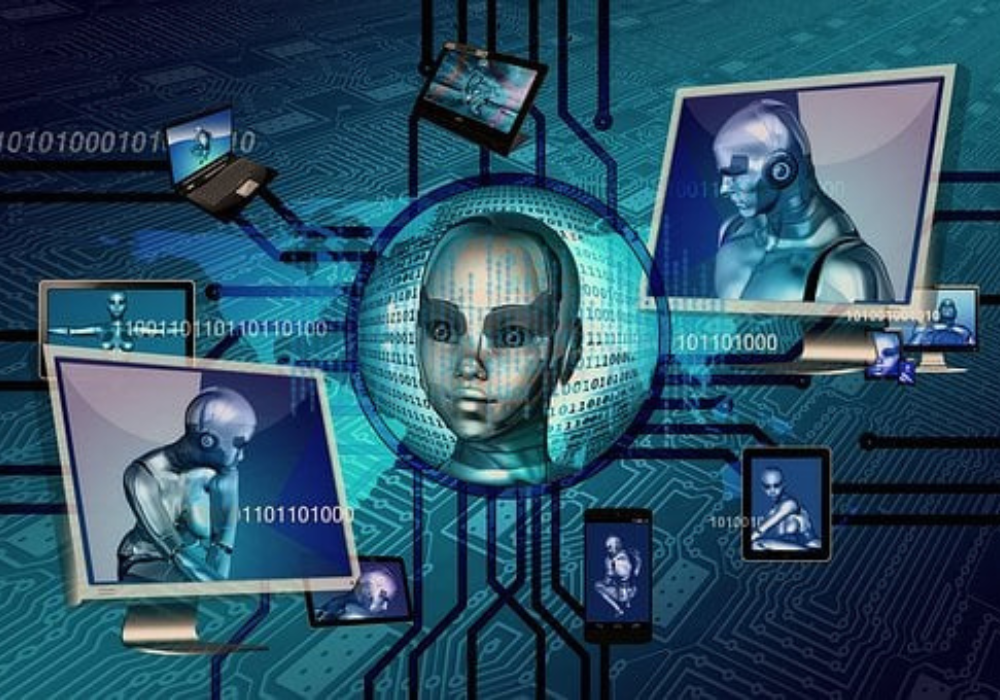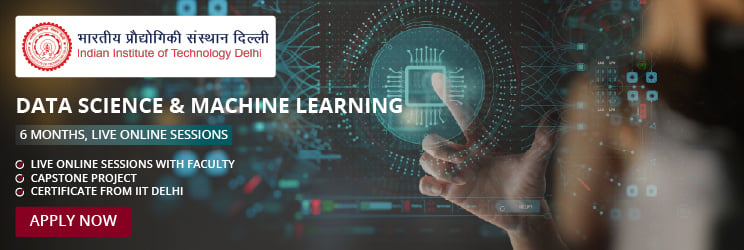Harness the Power of AI and Data Science for Better Business Outcomes

- What is the Difference Between Artificial Intelligence and Data Science?
- How Does Big Data Influence Artificial Intelligence and Data Science?
- Popular Applications of Artificial Intelligence in Data Science
- What are the Skills Required for a Career in Artificial Intelligence and Data Science?
- How Can Businesses Leverage Artificial Intelligence and Data Science to Gain a Competitive Advantage?
- Learn Data Science Fundamentals with Emeritus
IT modernization is on the minds of many Indian companies. That’s why they are using modern technologies like Artificial Intelligence (AI) and data science. According to a recent news report, Indian companies are expected to spend $85 billion by 2026 on digital transformation. It’s not hard to predict, then, that going forward, tech-savvy companies will employ a workforce well-versed in modern technologies. Therefore, to build a successful career in 2023, employees should have a basic understanding of concepts like cloud computing, blockchain technology, artificial intelligence, and data science.
What is the Difference Between Artificial Intelligence and Data Science?
While both artificial intelligence and data science are transforming the world, there is a distinct difference between the two. AI is the science of making intelligent machines that can mimic the problem-solving capabilities of humans. On the other hand, data science is a multidisciplinary approach to identifying, exacting, analyzing, and interpreting data points. Let’s look a little deeper at how artificial intelligence and data science differ from each other:
- A data scientist is responsible for deriving actionable insights from large data sets. Meanwhile, artificial intelligence professionals are responsible for ensuring that machines function smoothly without human intervention.
- Data scientists use different statistical methods for analysis. Whereas, AI employs algorithms to make predictions.
- Data science can build complex models for extracting insights using data science. On the other hand, artificial intelligence can build models that emulate human cognition and understanding.
- Python, R, Structured Query Language (SQL), and Tableau are tools that data scientists use. Whereas, Tensorflow, Scikit-Learn, and SHogun are the tools that AI uses.
In summary, AI is focused on building intelligent systems, while data science focuses on extracting insights from data.
Also Read: What is Data Science – Meaning and Career Opportunities
How Does Big Data Influence Artificial Intelligence and Data Science?
Big data, artificial intelligence, and data science are interconnected. That means the rise of big data positively impacts both AI and data science. For instance, large amounts of data have helped AI systems and data science processes make accurate predictions. Furthermore, the rise of big data has also led to the development of new tools and technologies for storing, processing, and analyzing large data sets. For example, cloud computing is a new technology that has made it possible for businesses to store data in the cloud.
Popular Applications of Artificial Intelligence in Data Science
Almost all modern applications use AI and data science to make predictions, analyze large data sets, and more. Here’s a list of applications using artificial intelligence and data science.
1. Predictive Analytics
Predictive analytics is used in data science to find patterns and correlations. AI plays a significant role in this, too, by automating data analysis and modeling processes. This way, predictive analytics can make accurate predictions conveniently.
2. Natural Language Processing (NLP)
Natural language processing helps machines comprehend and understand human language. AI plays a pivotal role in NLP, where it enhances its capability to understand human language without anyone’s intervention. Furthermore, AI-powered algorithms can provide NLP systems with the data they require to analyze and understand human language.
3. Image and Video Recognition
Image recognition is the process of identifying people, patterns, and objects from different sources. Moreover, image recognition apps use artificial intelligence and machine learning algorithms for the classification, segmentation, detection, and tagging of images. On the other hand, these applications use data science tools and techniques for producing labeled data, which helps ML algorithms to learn the human-like vision of the world. Simply put, data science helps applications recognize images, patterns, and objects.
4. Fraud Detection
AI analyzes large amounts of data and identifies patterns that may indicate fraud or other types of financial crimes.
What are the Skills Required for a Career in Artificial Intelligence and Data Science?
To build a successful career in artificial intelligence and data science, aspirants must have a unique combination of technical and non-technical skills. Here are some of the most important ones necessary for a successful career in these fields.
1. Technical Skills
Aspirants trying to build a career in AI and data science should hone their technical skills. They must become proficient in programming languages such as Python, R, Java, and SQL. Besides that, they need to enhance their knowledge of machine learning algorithms, data modeling, data visualization, and more.
Also Read: What is the Future of Data Science & AI?
2. Mathematics and Statistics
Almost all AI and data science machines use mathematical or statistical formulas for analyzing and interpreting data. Therefore, aspiring data science and AI professionals must have a strong foundation in mathematics and statistics, including calculus, linear algebra, and probability.
3. Critical Thinking
Critical thinking is a way of thinking in a rational and organized manner about an idea or a situation. AI and data science professionals must think critically to be capable of solving complex problems using data and algorithms.
4. Effective Communication
With effective communication skills, AI and data science professionals can communicate key data analysis findings with stakeholders. Additionally, they can collaborate efficiently with different teams and explain complex technical concepts to key stakeholders.
5. Curiosity
You should be willing to learn new skills and techniques because AI and data science go on to evolve from time to time. Therefore, being curious helps AI and data science professionals to stay up-to-date.
How Can Businesses Leverage Artificial Intelligence and Data Science to Gain a Competitive Advantage?
Business organizations across industries are using AI and data science to gain an edge over their competition. Here’s how AI and data science help businesses stay ahead of their competition.
1. Streamline Business Processes
AI and data science automate business processes, which reduces the time taken to complete a task. Therefore, it increases the efficiency and productivity of employees. For instance, companies can use AI-powered machines to perform administrative work.
2. Reduce Risk
AI helps businesses detect, prevent, and avoid business risks. Companies can use data science tools and techniques to analyze past performances and make inferences about the future. Further, these tools can help in tracking the risks that can affect the organization.
3. High-Efficiency Marketing
AI and data science have the ability to give companies an edge in marketing. They offer insights into how to market, who to market to, when and where to market, and why to market. These insights can help in formulating effective and efficient marketing strategies. Moreover, efficient marketing creates touch points for customer and brand interactions at the right place, at the right time, and with the right message.
Learn Data Science Fundamentals with Emeritus
To develop a successful career in data science and AI, enroll in Emeritus’ data science courses. They equip learners with the tools and techniques for handling, managing, analyzing, and interpreting data. Joining these courses will help learners gain a competitive advantage over others.







